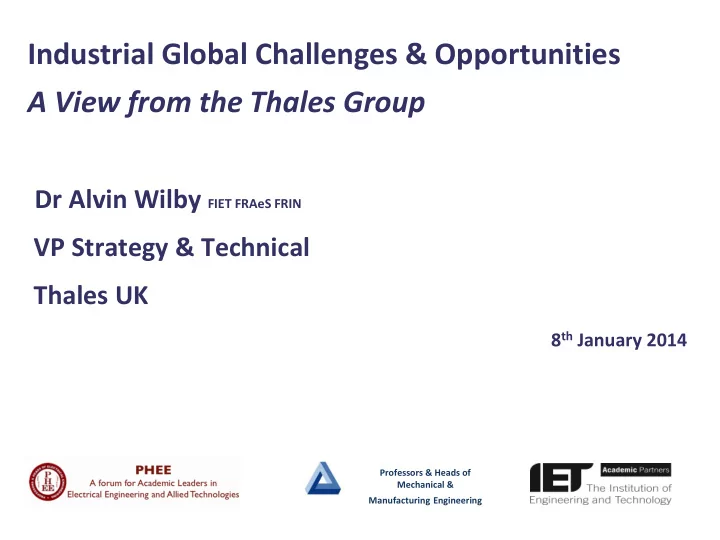

Industrial Global Challenges & Opportunities A View from the Thales Group Dr Alvin Wilby FIET FRAeS FRIN VP Strategy & Technical Thales UK 8 th January 2014 Professors & Heads of Mechanical & Manufacturing Engineering
Key Topics 2 / The Thales Context UK Positioning for Global Markets UK Political Environment Sources of Market Growth Disruptive Technologies Our Professional Engineers
3 / The Thales Context
How our customers see the world… 4 / 4 / 4 / A complex world where the security of people and goods, infrastructure and nations depends on the ability of organisations to make the right decisions and act in a timely fashion to obtain the best outcomes
in all the markets we serve… 5 / Dual markets civil / military Space Aerospace Security Ground Defence Transportation Trusted partner for a safer world
focused on a single mission… 6 / Enable our customers to decide quickly in critical situations Data gathering, processing and distribution Tools and technologies to help customers understand complex situations, decide and act in a timely fashion and obtain the best outcomes Engineering development and innovation Large-scale software-driven systems, secure communications, sensors, command & control, onboard electronics, satellites and complex systems integration Human factors Physical and cognitive sciences applied to human-system interaction Binding all our businesses together
Worldwide operations… 7 / 67.000 employees in 56 countries Global reach, local expertise
and global leadership 8 / Payloads for Air Traffic Sonars Security for telecom Management interbank satellites transactions Rail signalling In-flight entertainment Military tactical systems and connectivity radiocommunications Avionics Surface radars Civil satellites € 14 billion in revenues
A strategy driven by innovation… 9 / Long-term vision 20% of revenues invested in R&D Focus on key technical domains Complex systems Hardware (sensor technologies) Software Algorithms and decision support Albert Fert, scientific director of the CNRS/Thales Open research policy joint physics unit and winner of the 2007 Nobel Prize in Physics . International network of research centres Cooperation with academic and government research institutes worldwide Focused product policy Shorter development cycles Risk reduction Inventing tomorrow ’ s products today
10 / UK Positioning for Global Markets
Key Factors 11 / Fading heritage Competitive Advantage Capability Inspiration Sovereign Requirements Few remaining - Nuclear, Cyber Military Operational Freedom Military Independence of Action Presumption of Coalition Interdependence Presumption of Free Markets (Defence & Civil) International Standards Facilitate global markets e.g. RTCA DO178B Differentiation through “gold standard” still possible e.g. CAA Global Companies International Ownership “Multi - Domestic” Structures
12 / The Political Environment
Free Markets 13 / Long Standing HMG Presumption of “Free Markets” • Strategy to avoid industrial strategy • Support of indigenous industry weakens competitivity in export markets • Competition the only objective demonstration of Value for Money Risks • Implicit assumption that global playing field is level • Largest markets are often quasi monopsonistic, distorting supply side dynamics • Many UK Industrial Assets in International Ownership / Parent companies free to move R&D, production etc Response to domestic social situation Need to build footprint in growth countries
Why invest in the UK? 14 / • Market Scale • Early Adopter • Tax & Tax Credit Regimes • (Pension Regime) • Government investments (e.g. “Growth Partnerships” – AGP/CGP/DGP; Increase in ESA contribution) • Government to Government Relationships (e.g. Anglo French Defence Treaty, Middle East Security Programmes) • Employment Legislation • Key Skills • Key Technologies • Innovative Environment
Global Innovation Index 2013 15 / Rankings UK No. 3 US No. 5 Fr No. 20
16 / Sources of Market Growth
Sources of growth 2014 17 / CANADA 2.2% US 2.6% PERU 5.7% CHILE 4.5%
Foreign students studying in the UK 18 / BRIC countries or regions 103 Brazil 287 Russia 6846 India 11,144 China (In STEM skills relevant to Thales. Source Higher Education Statistics Agency.)
19 / Disruptive Technologies
The Quantum “Cyber Arms Race” 20 / Quantum Computing vs Quantum Encryption
Graphene 21 / Hydrodynamic Anisotropic Coatings Heat Sinks Flexible displays Photonic Acoustic Devices Sensors High Capacity Batteries & High frequency Super transistors Capacitors Spintronic devices/quantum computers
22 / Our Professional Engineers
Engineering Talent Pipeline Issues 23 / 2010 & 2020 Demographics Average Age of Thales Engineer In 2013 Need to ensure that the pipeline is maintained… Source: RAEng, UCAS and Office of National Statistics
Female Engineers 24 / Source: BIS, Professor John Perkins’,Review of Engineering Skills
Leaky Pipe 25 / Source: BIS, Professor John Perkins’,Review of Engineering Skills
Our pipe line 26 / • Get a minimum of a 2:1 Industry Advisory Panels for most positions Final year project support • Pass security clearance Talks to final year students Placements Undergraduate GDP Primary Secondary & University Fast-track School School Pool Research & Postgraduate Training Visiting Professors Technical Supporting: Teaching Research Masters Projects Sponsored Chairs Projects Doctoral Students Secondments (PhD & EngD)
Thales Graduate Scheme 27 / The Thales Graduate Development Programme achieved full Accreditation status on 21st November 2013 for a further 4 years Accredited by IET. IMechE, RAeS and the IoP
Summary 28 / • Markets globalising – even traditional sovereign markets such as defence • UK a generally positive environment for innovation • UK policy implicitly assumes a free market global level playing field (it’s not) • Improved industrial/government strategic cooperation essential and need not compromise competitivity • Economic growth demands a more coherent approach to key export markets • Strategic Alignment of Government/Academia/Industry essential We must convert UK technology leadership (e.g. graphene) to UK industrial leadership We must fix the UK Engineering Pipeline – improve approach to managing STEM skills from “cradle to grave”
Recommend
More recommend